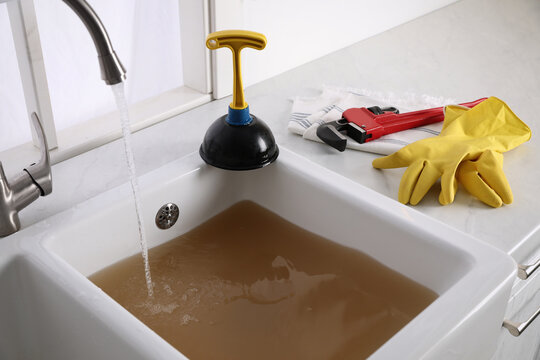Were you interested in facts around Tips on How to Effectively Use a Plunger?

Introduction
Proper maintenance of household drains is important for preventing clogs and ensuring smooth water circulation. Among the secret tools in every homeowner's toolkit is the bettor, together with different drain cleansers created to tackle persistent blockages efficiently. This article discovers how to make use of plungers and drain cleansers effectively to maintain your drains moving freely.
Area 1: Understanding Bettors
Types of Plungers
There are a number of types of plungers readily available, each developed for various types of drains and obstructs. The most typical kinds include mug plungers, flange plungers, and accordion bettors.
Just How Plungers Job
Plungers service the concept of developing stress and suction to dislodge blockages. When effectively used over a drainpipe, they develop a vacuum cleaner that can take out particles or break up obstructions.
Choosing the Right Plunger
Picking the appropriate bettor depends upon the type of drain and the nature of the obstruction. Mug plungers are perfect for sinks and tubs, while flange bettors are better matched for bathrooms due to their layout.
Typical Mistakes with Bettors
Preventing these blunders makes sure effective plunging: inappropriate seal around the drain, inadequate force, and not clearing surrounding particles.
Area 2: Using Plungers Properly
Preparation
Before diving, make sure the plunger covers the drainpipe completely and creates a tight seal. Clear any kind of visible particles around the drain opening.
Strategy
Start with mild plunging movements to build suction. Boost stress gradually, utilizing a steady rhythm. Repeat as essential till the drain clears.
Repairing Tips
If plunging doesn't function, try readjusting the seal, applying oil jelly for a far better seal, or making use of a various sort of bettor.
Section 3: Understanding Drainpipe Cleansers
Kinds Of Drain Cleaners
Drain pipes cleaners can be chemical or enzymatic. Chemical cleansers utilize strong chemicals to liquify blockages, while enzymatic cleansers utilize all-natural enzymes to break down raw material.
How Drainpipe Cleaners Job
Chemical cleaners respond with clogs to liquify them, while chemical cleansers break down organic products like hair and grease without damaging pipes.
Safety Factors to consider
Constantly wear handwear covers and eye protection when utilizing chemical drainpipe cleansers. Guarantee adequate air flow and comply with manufacturer guidelines meticulously.
Eco-Friendly Alternatives
Think about making use of vinegar and cooking soda or enzyme-based cleansers for environmentally friendly alternatives that are much safer for pipelines and the environment.
Area 4: Using Drainpipe Cleaning Company Properly
Application Methods
Pour chemical cleansers directly into the drainpipe opening. Permit them to work for the advised time prior to flushing with warm water. Chemical cleaners need to rest over night.
Precautions
Avoid blending various sorts of cleaners, as this can produce harmful fumes. Never use chemical cleansers combined with a bettor, as splashing can occur.
Handling Persistent Blockages
For persistent obstructions, take into consideration utilizing a plumbing serpent or calling a professional plumber to avoid damage to pipelines.
Conclusion
Finally, understanding just how to use bettors and drainpipe cleaners properly is vital for maintaining healthy pipes systems. By picking the right tools and methods, homeowners can tackle small blockages and prevent significant plumbing problems down the line.
How To Properly Use A Plumbing Snake To Clear Drains
When any drain clogs in our home arise, we tend to gravitate toward the plunger and little else. In cases where the plunger and its vacuum-created pressure are not able to clear clogs, many immediately move to harmful chemicals or simply call their plumber to fix the issue.
we’re happy to help with all drain cleaning needs and concerns. This includes informing you on a few other home remedies you may have at your disposal for minor to moderate clogs, one of which is the use of a plumbing snake. Many people have never used one of these before – let’s go over the steps to take when your drain clogs and you have a plumbing snake available.
Attempt Plunger Use
The first step here, as we noted above, should indeed be to grab your plunger when you notice a drain clog and attempt to resolve it this way. If you’re unsure how to use a particular type of plunger, our plumbers can answer any questions you have. If this doesn’t do the trick, however, you move on to the snake.
Locate And Prepare Snake
A plumbing snake is a metal or plastic device that’s generally about a quarter of an inch thick. It’s design with significant extensions, meant to reach down into your clogged drain and push the clog out. Snakes also contain drain augers that will latch onto and push stubborn blockages.
If your plunger doesn’t clear a clog, locate your snake and bring it to the drain in question. We also recommend keeping a bucket nearby to collect the clog once you pull it out, plus we’d advise wearing goggles and possibly protective gloves.
Feed Snake
Once you’re ready to go, feed the snake slowly down the drain, using the crank device it comes with to keep it moving until it finds the clog. Once this happens, much of the clog will be latched onto the coil so you can pull it out, while the rest will simply break up and flow downward.
Detach Debris
Remove the snake slowly from the drain, and once you’ve done so, pick off any debris that’s stuck to the coil. This is another area where wearing gloves is a must.
Flush Drain
Finally, take a few minutes to ensure the snake has done its job correctly. If you’ve been using it on a toilet, flush the toilet a couple times and make sure everything flows well. If you’ve used it on a different drain, flush it with some room temperature water.
https://www.mybuddytheplumber.com/blog/how-to-properly-use-a-plumbing-snake-to-clear-drains/

Application Methods
Pour chemical cleansers directly into the drainpipe opening. Permit them to work for the advised time prior to flushing with warm water. Chemical cleaners need to rest over night.
Precautions
Avoid blending various sorts of cleaners, as this can produce harmful fumes. Never use chemical cleansers combined with a bettor, as splashing can occur.
Handling Persistent Blockages
For persistent obstructions, take into consideration utilizing a plumbing serpent or calling a professional plumber to avoid damage to pipelines.
Conclusion
Finally, understanding just how to use bettors and drainpipe cleaners properly is vital for maintaining healthy pipes systems. By picking the right tools and methods, homeowners can tackle small blockages and prevent significant plumbing problems down the line.
How To Properly Use A Plumbing Snake To Clear Drains
When any drain clogs in our home arise, we tend to gravitate toward the plunger and little else. In cases where the plunger and its vacuum-created pressure are not able to clear clogs, many immediately move to harmful chemicals or simply call their plumber to fix the issue.
we’re happy to help with all drain cleaning needs and concerns. This includes informing you on a few other home remedies you may have at your disposal for minor to moderate clogs, one of which is the use of a plumbing snake. Many people have never used one of these before – let’s go over the steps to take when your drain clogs and you have a plumbing snake available.
Attempt Plunger Use
The first step here, as we noted above, should indeed be to grab your plunger when you notice a drain clog and attempt to resolve it this way. If you’re unsure how to use a particular type of plunger, our plumbers can answer any questions you have. If this doesn’t do the trick, however, you move on to the snake.
Locate And Prepare Snake
A plumbing snake is a metal or plastic device that’s generally about a quarter of an inch thick. It’s design with significant extensions, meant to reach down into your clogged drain and push the clog out. Snakes also contain drain augers that will latch onto and push stubborn blockages.
If your plunger doesn’t clear a clog, locate your snake and bring it to the drain in question. We also recommend keeping a bucket nearby to collect the clog once you pull it out, plus we’d advise wearing goggles and possibly protective gloves.
Feed Snake
Once you’re ready to go, feed the snake slowly down the drain, using the crank device it comes with to keep it moving until it finds the clog. Once this happens, much of the clog will be latched onto the coil so you can pull it out, while the rest will simply break up and flow downward.
Detach Debris
Remove the snake slowly from the drain, and once you’ve done so, pick off any debris that’s stuck to the coil. This is another area where wearing gloves is a must.
Flush Drain
Finally, take a few minutes to ensure the snake has done its job correctly. If you’ve been using it on a toilet, flush the toilet a couple times and make sure everything flows well. If you’ve used it on a different drain, flush it with some room temperature water.
https://www.mybuddytheplumber.com/blog/how-to-properly-use-a-plumbing-snake-to-clear-drains/

We had been made aware of that editorial about How To Use Your Toilet Plunger Correctly in 5 Easy Steps through a pal on another domain. For those who enjoyed reading our article if you please be sure to pass it around. Bless you for being here. Please visit our blog back soon.
Click